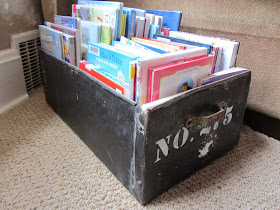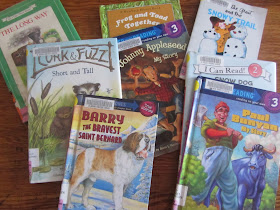What does reading time look like at your home? Do you make your kids read out loud to you? Do you have particular reading books they have to read from or do you just let them read whatever they want?
I've received these and other reading-type questions lately.
While our reading time has morphed a bit over the years due to the dynamic and differing personalities of my children, this is what reading currently looks like in my home.
While our reading time has morphed a bit over the years due to the dynamic and differing personalities of my children, this is what reading currently looks like in my home.
Read for Fun Book
What is it?
The oldest three kids are each required to pick out a "read for fun/pleasure" book every few days/weeks (Basically, when they finish one, they have to move on to another one.) They read these books silently to themselves for at least fifteen minutes each school day. While they can certainly read much longer than that, and most often do, they HAVE to read at least that much. These reading times are, for the most part, unscheduled and can happen whenever they will fit in the day. My kids have all gotten into a bit of a personal pattern of "fun" reading at particular times in the daily routine. By reading at the same time each day, it helps them remember to do it so that I don't have to nag them.
How is it chosen?
While I often suggest titles I think my daughter will enjoy, I leave it up to her to choose her "read for fun/pleasure" book. She always filters the title through me just in case there is something about the book that would deem it inappropriate reading material. But, over the years, she has proven to be quite discerning and trustworthy in her book selections, as she learns to use Philippians 4:8 as a guide.My oldest two boys are still in the emergent reader stage. While they will occasionally find a book title that intrigues them, more often than not, they need some inspiration...or at least some suggestions from which to choose from. So, I, typically, bring home a healthy stack of "fun" books from the library with their personal interests in mind. I toss this mighty heap of trade-show readers and early chapter books in a large bin next to the couch and leave it to them to choose a book to read for "fun." This helps give them direction while still affording them a choice in what they will read.
What's the point?
I want my kids to develop a love of reading. I want my home to be a place where reading isn't just another assignment to check off a list, it is an integral part of our daily culture...a large piece of the rhythm of our days. One way of developing that is by allowing my kids the freedom to read...without my input or "helpful hints." By encouraging them to read silently to themselves, even when they are still in the learning-to-read-stage, I am allowing them to simply enjoy the story...to be captivated by the color of the black and white page. They can read for reading's sake and slowly...ever so slowly and with gentle guidance...develop discernment since the choice is, for the most part, left up to them.
Mom-assigned Book
What is it?
A mom-assigned book is what I would consider the "official" reading book of the week/month. It's a book I have intentionally selected for my kids with content and reading level/skill in mind. As a very vague/general rule, I typically require them to read one chapter of their mom-assigned book each day. Obviously, some chapter books have very long chapters, in which case, I might assign him/her to read a particular number of pages each day.While it is always helpful to start with staged readers for new emergent readers (preschool through early first grade), I find the story-lines of most elementary readers quite boring...and so do my kids. How can I expect them to develop a passion for reading if I don't provide them with a captivating story? (Sorry, Dick and Jane, With a world of literary masterpieces just waiting to be read, we'd rather not waste our time on you!) So, as soon as my kids have learned most of the phonics rules and sounds, we toss those staged curriculum-type readers aside and opt for well-crafted BOOKS instead!
How is it chosen?
To be honest, I almost always have a few potential titles for each of my kids in the back of my mind. I jot them down or add them to our ever-growing GoodReads list (I've made a "shelf" for each of my kids to help better-manage my lengthening log.) On the rare chance I need to scramble for a title selection, I consult one of my favorite books about books, Honey for a Child's Heart, or a few trusted, on-line resources. My current GO-TOs are...- Great Read Alouds for Lower to Mid Elementary
- The Sonlight Read Aloud List and The Sonlight Reader List (cataloged by grade/age level)
- Simply Charlotte Mason Book Finder
- Twaddle Free Literature by Grade Level (From Charlotte Mason Home Education)
- 1000 Good Book List (From Classical Christian Education)
I try to vary the literary genre of the books I select in order to introduce my kids to styles of writing that are unfamiliar. This has helped them each determine their own personal preferences of writing styles and themes. My boys have discovered that they like non-fiction books about history and science and my daughter leans more towards fiction and fantasy.
What's the point?
I categorize reading and readers into two camps. There are the learning-to-read kids and the reading-to-learn kids. At the risk of making a gross generalization out of a very unique-to-each-person kind of skill, most preschoolers through second graders are in the learning-to-read group while most fourth graders and beyond are in the reading-to-learn group. Third grade is a unique year, in my opinion. Although, most kids have typically learned the skills necessary to read by third grade, not all kids are really ready to read-to-learn. Many often need one solid year of practice in order to perfect their skills of reading.That being said, the "point" of a mom-assigned book is different for both camps of readers.
For my younger kids, I select books that will develop and build upon their current phonetical skills. I consider their mom-assigned book to be more of a "reader", a book designed to establish reading practice. At this stage, it is less about WHAT is being read and more about HOW it is being read. I require my third grade and under (or any kids who are still in the "learning" stage) to read out loud to me.
For my daughter, who is currently my only reading-to-learn kiddo, I select books with content in mind. With purpose, I assign her books that will expand her thinking, broaden her horizons, challenge her, and teach her something worthwhile. Oftentimes, my selections are influenced by our conversations together. I choose exceptional fiction to introduce her to quality writing and intriguing characters. I choose biographies to help shape her character and acquaint her with men and women whose lives have helped shape the world. I choose "How To"/Informational style, non-fiction books to teach her the things I can not teach her myself.
Because she is a fluid reader, I no longer require her to read her mom-assigned book out loud to me. However, I do find value, even for some adults, in read aloud practice. A person can be an excellent reader and yet not possess the skills required to effectively read out loud (inflection, tone, enunciation, expression). For this reason, I randomly ask her to read things out loud (the instructions in her grammar book, the weekly Bible verse we are memorizing, a picture book for her baby brother, etc) in order that she may practice these skills.
Her personality is such that I don't require her to write about her mom-assigned readings in book report form. Like her mother, she loves to dialogue about what she is currently reading with whomever will listen. I have no desire to stifle her desire by making it a requirement.
So that's HOW we have our reading time in our homeschool.
If you want to know WHAT we're reading, be sure to check out my monthly WHAT WE'RE READING lists.
And now it's your turn. Got any great tips or advice for what reading time looks like in your homeschool. Be sure to leave it in the comments section. It's always helpful to be able to peek into the daily lives of other homeschoolers as long as we all remember that what works for one, may not always work for all.
For more thoughts on reading time
The Quick-Start Guide to Talking About Books with Kids {with a Free printable}





We love that you encourage reading for fun -- the natural way to learn -- and that you add carefully chosen mom-assigned books as well. Thanks for sharing your great book lists! We thought you and your readers might like our own list, packed with book-related resources. Enjoy! http://www.litwitsworkshops.com/free-resources/
ReplyDeleteBecky & Jenny
LitWits Workshops
For the mom assigned books for early readers, can you give an example of some titles?? We are also over the emergent readers and ready to move on, but I just can't figure out the next logical step. My son is finishing 1st grade. Many thanks!
ReplyDeleteEach month, I post a list of what all of us are reading. You can check out all the list I've posted so fare here. It will give you some good suggestions. Then, if you type these into Amazon, you'll get other title suggestions that are similar in content/skill level.
Deletehttp://www.theunlikelyhomeschool.com/search/label/What%20We%27re%20Reading
I will be homeschooling for the first time beginning this summer; an 11th grader and a 4th grader. Thank you so much for sharing your "how". I am still trying to figure out exactly how I am going to get this moving and your post helped me considerably, especially your comments about 3rd grade readers. My two older children did not become truly fluent in reading and able to read to learn until 4th grade and it looks like my youngest is following the same pattern. We are planning on sticking to 3rd grade readers for her independent reading to give her that extra year of practice. Thanks, again!
ReplyDeleteEvery child is different, but it's been my experience that this is a good rule of thought to follow. Good luck on your first year! Just remember, to give yourself lots of grace and enjoy your children.
DeleteI know you posted this a while back, but I am just not referring to it as I am some need in reshaping how reading happens at our house. Thank you so much for this, and taking time to write it and link to those great book lists. Super helpful!
ReplyDeleteGlad to know it was helpful.
Delete